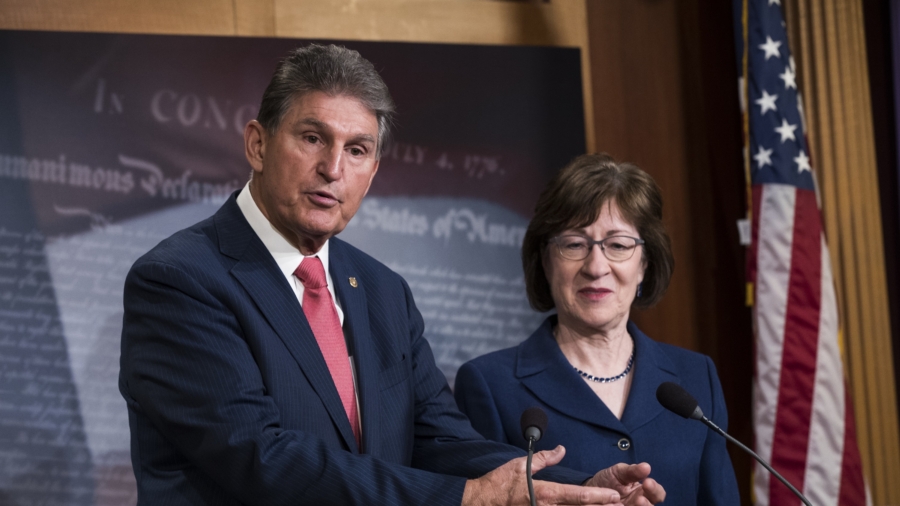A bipartisan group of senators, including nine Republicans, have reached a deal to change federal election law, a substantial victory for Democrats hoping to exceed the 60-vote filibuster threshold in the upper chamber.
The proposals include two bills meant to alter U.S. election laws in response to President Donald Trump’s efforts in 2020 to have Vice President Mike Pence throw out electoral votes from states accused of widespread voter fraud.
Similar to all legislation in the upper chamber, at least 60 senators will need to rally behind the bills to limit debate and send them to the floor for a simple majority vote. The bills likely will have the support of all 50 Democrats, but will need the support of at least 10 additional Republicans to overcome the filibuster threshold. With nine Republicans backing the bills, only one other Republican needs to be swayed by proponents for passage of the legislation.
Negotiations to craft the legislation were led on the Democrat side by Sen. Joe Manchin (D-W. Va.) and on the Republican side by Sen. Susan Collins (R-Maine). Six other Democrats joined Manchin in negotiations, while eight other Republicans joined Collins.
The first of the two bills would alter the Electoral Count Act [ECA] of 1887, which Democrats have attempted to do for months now. That law was at the center of attention on Jan. 6 and the weeks leading up to it, as Trump attempted to make the case that legal ambiguities in the text of the 1887 law allowed the vice president to refuse to count some electoral votes.
Amid ongoing contention over potential fraud in the 2020 election, Trump further tried to persuade Pence to use his role under the original ECA to challenge the results in several state elections that posed the highest risk of widespread fraud. Pence refused, allowing Joe Biden to be confirmed as the president-elect by the Senate.
The legal validity of this effort has been contested; while opponents of the 2020 scheme have argued that the vice president has only a “ceremonial” role in confirming electoral votes, its supporters have argued that the text of the law opens the door to what Trump attempted on January 6.
In response to this, the new law would close debate by declaring the vice president’s role to be only ceremonial.
The bill also would provide new rules for the transition of power in the event of a contested election. The bill dictates that if neither candidate concedes within five days of the election, both major candidates will receive access to transition resources until “it is substantially certain who will win the majority of electoral votes.” When a “clear winner of the election” is determined, only that person will be able to access transition resources.
The bill also would increase requirements to reject a slate of electors during the congressional certification process.
Under the 1887 law, only one member of the House and one member of the Senate need to object to a slate of electors to force the entire Congress to vote on whether to sustain or strike down the objection; the new bill would raise the number of objectors, to one-fifth of members, needed to force such a vote.
The first bill is sponsored by nine Republicans and seven Democrats.
The second bill, which has the support of five Republicans and seven Democrats, would increase federal penalties for threatening or intimidating election officials, which the Jan. 6 Committee has claimed that Trump supporters did in key battleground states. It also would increase penalties for tampering with election records.
Sen. Mark Warner (D-Va.), one of the sponsors of the bills, said that they are an important congressional response to the events of January 6.
“Anything we can do and show to the American public that we realize how serious that day was, and that we’re going to do all we can to prevent a repeat of January 6th, is a step in the right direction,” Warner said, adding, “Any future vice president cannot, should not, will not be able to overturn legitimate votes of Americans and their electors that states vote.”
With the announcement of the deal, the bills will now move to the Senate Rules Committee, where Chairwoman Amy Klobuchar (D-Minn.) said they will face a vote on Aug. 3. This date, falling two weeks after the compromise deal was announced, suggests that the bill will not move quickly through the Senate, but is instead on track for a long and drawn-out consideration process.
From The Epoch Times

